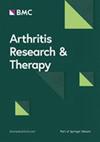Anti-interferon-α antibodies associate with disease activity and prognosis in anti-MDA5-positive dermatomyositis
IF 4.6
2区 医学
Q1 Medicine
引用次数: 0
Abstract
Interferons (IFN) are implicated in the pathogenesis of anti-MDA5 dermatomyositis (anti-MDA5-DM), but the presence of anti-IFN antibodies remains unclear. This study aims to assess serum levels of anti-IFN-α antibodies in anti-MDA5-DM patients and explore their clinical associations. Serum samples from 176 anti-MDA5-DM patients and 55 healthy controls were analyzed for anti-IFN-α antibody levels using an in-house ELISA assay, with immunoblot validation in a subset. Associations between anti-IFN-α antibodies and disease activity or prognosis were assessed. The prevalence of anti-IFN-α antibodies in anti-MDA5-DM patients was 17.6% (31/176), with higher rates in those aged over 60 years. Anti-IFN-α antibody-positive patients exhibited significantly higher incidences of RP-ILD (67.7% vs. 41.4%, p = 0.008) and pulmonary infections (74.2% vs. 46.2%, p = 0.005), with fungi, particularly Aspergillus, being the predominant pathogens. Serum anti-IFN-α antibody levels positively correlated with IgG (r = 0.48, p < 0.0001), ESR (r = 0.28, p = 0.003), ferritin (r = 0.16, p = 0.03), lung VAS (r = 0.24, p = 0.01), and PhGA VAS (r = 0.28, p = 0.002). Longitudinal analysis showed that changes in anti-IFN-α antibody levels paralleled changes in skin VAS, lung VAS, and PhGA VAS (p = 0.015, 0.005, and 0.004, respectively). Notably, treatment-aggravated cases had increased anti-IFN-α antibody levels from baseline (p = 0.017), while remission cases showed decreased levels (p = 0.004). Mortality was significantly higher in anti-IFN-α positive patients (Log-rank p = 0.006). A subset of anti-MDA5-DM patients demonstrated positive serum anti-IFN-α antibodies. The significant association of these antibodies with disease activity and prognosis suggests their potential as a clinical biomarker. Monitoring anti-IFN-α antibody levels may provide an effective means to assess treatment response and predict outcomes in anti-MDA5-DM.抗干扰素-α抗体与抗mda5阳性皮肌炎的疾病活动性和预后相关
干扰素(IFN)与抗mda5皮肌炎(抗mda5 - dm)的发病机制有关,但抗IFN抗体的存在尚不清楚。本研究旨在评估抗mda5 - dm患者血清中抗ifn -α抗体水平并探讨其临床相关性。使用内部ELISA法分析了176名抗mda5 - dm患者和55名健康对照者的血清样本的抗ifn -α抗体水平,并对一部分患者进行了免疫印迹验证。评估抗ifn -α抗体与疾病活动性或预后之间的关系。抗mda5 - dm患者中抗ifn -α抗体的患病率为17.6%(31/176),年龄在60岁以上的患者中患病率更高。抗ifn -α抗体阳性患者RP-ILD发生率(67.7%比41.4%,p = 0.008)和肺部感染发生率(74.2%比46.2%,p = 0.005)显著升高,真菌,尤其是曲霉是主要病原体。血清抗ifn -α抗体水平与IgG (r = 0.48, p < 0.0001)、ESR (r = 0.28, p = 0.003)、铁蛋白(r = 0.16, p = 0.03)、肺VAS (r = 0.24, p = 0.01)、PhGA VAS (r = 0.28, p = 0.002)呈正相关。纵向分析显示,抗ifn -α抗体水平的变化与皮肤VAS、肺VAS和PhGA VAS的变化相似(p分别= 0.015、0.005和0.004)。值得注意的是,治疗加重病例的抗ifn -α抗体水平较基线升高(p = 0.017),而缓解病例的抗体水平下降(p = 0.004)。抗ifn -α阳性患者的死亡率显著高于对照组(Log-rank p = 0.006)。一部分抗mda5 - dm患者血清抗ifn -α抗体呈阳性。这些抗体与疾病活动性和预后的显著相关性表明它们具有作为临床生物标志物的潜力。监测抗ifn -α抗体水平可能提供评估治疗反应和预测抗mda5 - dm结果的有效手段。
本文章由计算机程序翻译,如有差异,请以英文原文为准。
求助全文
约1分钟内获得全文
求助全文
来源期刊

Arthritis Research & Therapy
RHEUMATOLOGY-
CiteScore
8.60
自引率
2.00%
发文量
261
审稿时长
14 weeks
期刊介绍:
Established in 1999, Arthritis Research and Therapy is an international, open access, peer-reviewed journal, publishing original articles in the area of musculoskeletal research and therapy as well as, reviews, commentaries and reports. A major focus of the journal is on the immunologic processes leading to inflammation, damage and repair as they relate to autoimmune rheumatic and musculoskeletal conditions, and which inform the translation of this knowledge into advances in clinical care. Original basic, translational and clinical research is considered for publication along with results of early and late phase therapeutic trials, especially as they pertain to the underpinning science that informs clinical observations in interventional studies.
 求助内容:
求助内容: 应助结果提醒方式:
应助结果提醒方式:


